- Home
- George R. R. Martin
Tuf Voyaging Page 7
Tuf Voyaging Read online
Page 7
“TUF? LION? WHAT ARE YOU TALKING ABOUT? THEY’RE DEAD, BOTH OF THEM.”
“Incorrect,” Anittas said. “They are both aboard even now. Lion has found the armory. He’s a walking arsenal, and he’s coming for you. Tuf has found something even more important. Rica Dawnstar is following the silver trace to the main control room, the captain’s chair. You see, Kaj Nevis, the gang’s all here. I have awakened every part of the Ark that remains functional, and I am leading them all by the hand.”
“STOP IT, THEN,” Nevis commanded. He did not hesitate. The great metal pincer reached out and embraced Anittas about his biometal throat. Black sweat oozed down onto the pincer’s serrated blade. “STOP THEM RIGHT NOW.”
“I have not completed my story, Kaj Nevis,” the cybertech said. His mouth was a smear of blood. “The last Imperials knew they could not go on. They shut down the ship, gave it up to vacuum and silence and the void. They made it go derelict. Yet not entirely, you see. They feared another attack, by the Hruun or perhaps, in time, others yet unknown. So they told the Ark to defend itself. They armed the plasma cannon and external lasers and kept the defense sphere functional, as we learned to our sorrow. And they programmed the ship to take a terrible vengeance for them, to return again and again and again to Hro B’rana, whence the Hruun had come, and to deliver its gift of plague and pestilence and death. To guard against the Hruun building up immunity, they subjected their plague tanks to constant radiation, to encourage endless mutation, and they established a program for automatic genetic manipulation to fashion ever newer and more deadly viruses.”
“I DON’T GIVE A DAMN,” Kaj Nevis said. “HAVE YOU STOPPED THE OTHERS? CAN YOU KILL THEM? I WARN YOU, DO IT NOW OR YOU’RE DEAD.”
“I am dead anyway, Kaj Nevis,” Anittas said, “I’ve told you that. The plagues. They left a secondary defense in place. Should the ship be breached once again, the Ark was programmed to wake itself, to fill the corridors with atmosphere, oh-yes, but an atmosphere tainted by a dozen different disease vectors. The plague tanks have been churning and boiling for a thousand standard years, Kaj Nevis, mutating again and again. There is no name for what I have contracted. Some kind of spore, I think. There are antigens, medicines, vaccines—the Ark has been manufacturing those, as well—but it’s too late for me, too late by far. I breathed it in, and it’s eating my biohalf alive. My cyberhalf is inedible. I could have given us this ship, Kaj Nevis. Together we might have had the power of a god. Instead we die.”
“YOU’LL DIE,” Nevis corrected. “AND THE SHIP IS MINE.”
“I think not. I have kicked the idiot giant soundly, Kaj Nevis, and it is awake again. Still an idiot, oh yes, but awake, and ready for orders you have neither the knowledge nor the capacity to give. I am leading Jefri Lion straight here, and Rica Dawnstar is ascending toward central control even now. And more—”
“NO MORE,” Nevis said curtly. The pincer crunched through metal and bone and took the cybertech’s head clean off with a single swift snap. The head bounced off Anittas’s chest, hit the floor, and rolled. Blood jetted from the neck, and a thick protruding cable gave a final futile hiss and threw off a blue-white spark before the body sagged against the computer console. Kaj Nevis drew back his arm and swung, smashing the console again and again, until it was a ruin and hundreds of shards of plastic and metal were scattered over the floor.
There was a high, thin whirring sound.
Kaj Nevis turned, faceplate glowing a bright bloody red, searching for the source.
On the floor, the head was looking at him. The eyes, the shiny silver eyes, tracked and focused. The mouth split into a wet grin. “And more, Kaj Nevis,” the head said to him. “I have activated the final line of defense programmed by those last Imperials. The stasis field is down. The nightmares are waking up now. The guardians are about to come forth and destroy you.”
“DAMN YOU!” Nevis shouted. He set a huge, flat foot atop the cybertech’s head, and brought down all his weight. Steel and bone alike crunched under the impact, and Nevis worked his foot back and forth, back and forth, grinding away until there was nothing beneath his heel but a red-gray paste spotted by flakes of white and silver.
And then, at last, he had silence.
For a long ways, two kilometers or more, the six traces in the floor ran parallel, although only the silver was alive and glowing. The red broke away first, veering off to the right at a junction. The purple terminated a kilometer farther on, at a wide door that proved to be the entrance to a spotless automated kitchen-mess hall complex. Rica Dawnstar was tempted to pause and explore a bit more, but the silver trace was throbbing and the overhead lights were going out one by one, urging her onward, down the main way.
Finally she came to the end. The broad corridor she was following curved gradually to the left and met another corridor just as grand. Their terminus was a huge wheel from which a half dozen lesser hallways branched off like spokes. The ceiling was high above her. Looking up, Rica spotted at least three other levels, connected with catwalks, bridges, and great circling balconies. At the hub of the wheel was a single large shaft that ascended from floor to ceiling—an elevator, clearly.
The blue trace followed one spoke, the yellow a second, the green a third. The shining silver guideway led straight to the elevator doors. The doors opened at her approach. Rica drove her scooter right to the base of the shaft, stopped, dismounted, hesitated. The elevator beckoned. But it looked awfully enclosed in there.
She hesitated too long.
All the lights went out.
There was only the silver trace, a single thin line like a finger, pointing straight ahead. And the elevator itself, its lights still blazing.
Rica Dawnstar frowned, drew her needler, and stepped inside. “Up, please,” she announced. The doors closed and the elevator began to ascend.
Jefri Lion walked with a spring in his step, despite the weight of the weapons he was carrying. He felt even better since leaving Celise Waan behind; that woman was nothing but a nuisance anyway, and he doubted that she’d be of much use in a skirmish. He had considered the possibility of stealth, and rejected it. He was not afraid of Kaj Nevis and his battlesuit. Oh, it was formidably armored, he had no doubt of that, but after all, it was of alien manufacture, and Lion was armed with the deadliest weaponry of the Earth Imperials, the height of the technological and military prowess of the Federal Empire of Old Earth as it had been before the Collapse. He’d never even heard of the Unquish, so what kind of armigers could they be? No doubt some obscure Hrangan slave race. He would deal with Nevis in short order if he found him, and with that treacherous Rica Dawnstar, too—her and that stupid needler. He’d like to see how a needler could possibly stand up against a plasma cannon. Yes, he’d like to see that.
Lion wondered what plans Nevis and his cohorts were making for the Ark. Something illegal and immoral, no doubt. Well, it made no matter, because he was going to take this ship—he, Jefri Lion, Associate Scholar in Military History at the ShanDellor Center, and one-time Second Tactical Analyst of the Third Wing of Skaeglay’s Volunteers. He was going to capture an EEC seedship, perhaps with Tuf’s help if he could find him, but he would do it in any event. Afterwards, there would be no selling of this treasure for crass personal gain. No, he would take the ship all the way to Avalon, to the great Academy of Human Knowledge, and turn it over to them with the proviso that he remain in charge of its study. It was a project that would last him the rest of his life, and when it ended Jefri Lion, scholar and warrior, would be spoken of in the same breath as Kleronomas himself, who had made the Academy what it was.
Lion strode down the center of the corridor with his head thrown back, following the orange trace, and as he walked he began to whistle a jaunty marching tune that he had learned in Skaeglay’s Volunteers a good forty years ago. He whistled and walked, walked and whistled.
Until the trace died out.
Celise Waan sat on the deck for a long time, her arms crossed tightly against her
breasts, her face set in a petulant frown. She sat until the sound of Lion’s footsteps had faded away entirely. She sat and brooded on all the insults and wrongs she had been forced to endure. They were all impossible, every one of them. She should have known better than to throw in her lot with such an unpromising and disrespectful crew. Anittas was more machine than man, Rica Dawnstar was an insolent little wretch, Kaj Nevis was no better than a common criminal, and Haviland Tuf was just unspeakable. Even Jefri Lion, her colleague, had proved unreliable in the end. The plague star was her discovery, and she had let them in on it, and what had it gotten her? Discomfort, rudeness, and finally abandonment. Well, Celise Waan didn’t intend to stand for it anymore. She had decided not to share the ship with any of them. It was her find, and she would go back to Shandicity and claim it under the salvage laws of ShanDellor, as was her right, and if any of her wretched companions had any complaints, they would have to take her to litigation. Meanwhile, she didn’t intend to talk to any of them, not ever again.
Her rear was getting sore and her legs had begun to fall asleep. She had been sitting in one position for a long time. Her back ached, too, and she was hungry. She wondered if there was any place she could get a decent meal aboard this derelict. Perhaps there was. The computers seemed to be working, and the defense systems, and even the lights, so perhaps the commissary was functioning as well. She got up and decided to go see.
It was obvious to Haviland Tuf that something was happening.
The noise level in the great shaft was rising, slowly but appreciably. He could make out a low humming sound quite distinctly, and those gurgling sounds were more noticeable as well. And in the tyrannosaur vat, the suspension fluid seemed to be thinning and changing colors. The red swirls had faded or been sucked away, and the yellow liquid grew more transparent with every passing moment. Tuf watched a waldo unfold from one side of the vat. It appeared as though it was giving the reptile an injection, though Tuf had difficulty observing the details, since the lighting was poor.
Haviland Tuf decided on a strategic retreat. He backed away from the dinosaur vat, and began to walk down the shaft. After he had come only a short way, he came upon one of the computer stations and work areas he had observed. Tuf paused.
He had experienced little difficulty discerning the nature and purpose of this chamber he had chanced upon. The Ark had at its heart a vast cell library, containing tissue samples from literally millions of different kinds of plant and animal and viral lifeforms from an uncounted number of worlds, or so Jefri Lion had informed him. These samples were cloned, as the ship’s tacticians and eco-engineers deemed appropriate, and so the Ark and its lost sister ships could send forth disease to decimate a world’s population, insects to devastate its crops, fast-breeding armies of small animals to wreak havoc on the ecology and food chain, or even terrible alien predators to strike fear into the heart of the enemy. Yet everything began with the cloning.
Tuf had found the cloning room. The work areas included equipment obviously intended for complex microsurgery, and the vats were undoubtedly where the cell samples were tended and grown to maturity. Lion had told him about the chronowarp as well, that vanished secret of the Earth Imperials, a field that could literally warp the fabric of time itself, albeit only in a small area, and at vast cost in energy. That way the clones could be brought to maturity in hours, or held, unchanging and alive, for millennia.
Haviland Tuf considered the work area, the computer station, and Mushroom, whose small body he still carried.
Cloning began with a single cell.
The techniques were no doubt stored in the computer. Perhaps there was even an instruction program. “Indeed,” Haviland Tuf announced to himself. It seemed quite logical. He was no cybertech, to be sure, but he was an intelligent man who had operated various types of computer systems for virtually his entire lifespan.
Haviland Tuf stepped up to the work station, deposited Mushroom gently beneath the hood of the micro-screen, and turned on the computer console. He could make no sense of the commands at first, yet he persisted.
After a few minutes he was intent on his labors—so intent that he did not notice the loud gurgling sound behind him when the thin yellow fluid in the dinosaur vat began to drain away.
Kaj Nevis smashed his way out of the system substation looking for something to kill.
He was angry—angry at himself for being impatient and unthinking. Anittas could have been useful; Nevis just hadn’t considered the possibility of contagion in the ship’s air. The damn cybertech would have had to have been killed eventually, of course, but that would not have been difficult. And now everything was falling apart. Nevis felt secure in the battlesuit, but still uneasy. He didn’t like hearing that Tuf and the others had somehow gotten aboard. Tuf knew more about this damn suit than he did, after all; maybe he knew its weaknesses.
Kaj Nevis had already pinpointed one of those weaknesses himself—his air supply was running low. A modern pressure suit, like the one Tuf was wearing, included an airpac. The bacteria infused in its filters turned carbon dioxide into oxygen as fast as a human being could turn oxygen into carbon dioxide, so there was never any danger of running out of air, unless the damn bugs went and died on you. But this battlesuit was primitive; it carried a large but finite supply of air in those four huge tanks on its back. And the gauge in his helmet, if he was reading it correctly, indicated that one of those tanks was nearly empty. That still left three, which ought to give him more than enough time to get rid of the rest of them, if only he could find them. Still, it made Nevis uneasy. He was surrounded by perfectly breathable air, to be sure, but he was damned if he was going to crack his helmet after what had happened to the cybertech. The organic part of Anittas’s body had decayed faster than Nevis would have believed, and the black goop that had eaten up the cybertech inside was as loathsome a sight as Kaj had ever seen, in a life that had featured lots of loathsome sights. He’d sooner suffocate, Kaj Nevis had decided.
But there was no danger of that. If the damned Ark could be contaminated, it could be cleansed, too. He’d find the control room and figure out how to do it. Even one clean sector would be enough. Of course, Anittas had said that Rica Dawnstar was already at the control room, but that did not faze him. In fact, he was kind of looking forward to that reunion.
He chose a direction at random and set off, his armored steps pounding against the deck. So let them hear him—what did he care. He liked this suit.
Rica Dawnstar sprawled in the captain’s chair and surveyed the readouts she had projected on the main telescreen. Well-padded, large, covered with comfortable old plastic, the chair felt like a throne. It made a good place to rest. The trouble was, you really couldn’t do anything but rest from there. The bridge had obviously been designed so that the captain sat in his throne and gave orders, and the other officers—there were nine other work stations on the upper bridge, twelve more in the lower-level control pit—did all the actual programming and punching of buttons. Lacking the foresight to have come aboard with nine flunkies, Rica was forced to move back and forth across the bridge, from one station to another, to try and get the Ark up and running again.
It took her a while—it was tedious work—and when she entered commands from the wrong substation, nothing happened. But slowly, step by step, she was figuring it all out. At least she felt as though she was making progress.
And she was secure. That had been her first objective, locking that elevator so that nobody else could come up and surprise her. As long as she was here and they were down there, Rica Dawnstar held the trump card. Every sector of the ship had its own substation, and every specialized function, from defense to cloning to propulsion to data storage, had its own sub-nexus and command post, but from up here she could oversee all of them, and countermand any command that anybody else might try and enter. If she noticed. And if she could figure out how. That was the problem. She could only man one station at a time, and she could only get things done when
she figured out the proper sequence of commands. She was doing it, yes, by trial and error, but that was a lengthy and cumbersome progress.
She slumped back in her padded throne and watched the readouts, feeling proud of herself on several counts. She had managed to elicit a shipwide status check, it seemed. The Ark had already given her a full damage report on those sectors and systems that had been inoperative for a thousand years, waiting for repairs beyond the ship’s capacities. Now it was telling her what programming was presently engaged.
The bio-defense listing was especially impressive, in a frightening sort of way. It went on and on. Rica had never heard of three-quarters of the diseases that had been unleashed to greet them, but they sounded unpleasant in the extreme. Anittas was no doubt one with the great program beyond the universe by now. Obviously, her next objective should be to try and seal off the bridge from the rest of the ship, irradiate and disinfect and try to see if she could get some uncontaminated air in here. Otherwise her suit was going to start getting pretty gamey in a day or two.
Up on the telescreen, it read:
BIO-DEFENSE PHASE ONE (MICRO)
REPORT COMPLETE
BIO-DEFENSE PHASE TWO (MACRO)
REPORT COMMENCING
Rica frowned. Macro? What the hell did that mean? Big plagues?
STAND-BY BIO-WEAPONS AT READY: 47
the screen told her, and it followed that cryptic bit of information with a lengthy list of species numbers. It was a boring list. Rica slumped back in the captain’s throne again. When the list ended, more messages rolled across the screen.

 A Dance with Dragons
A Dance with Dragons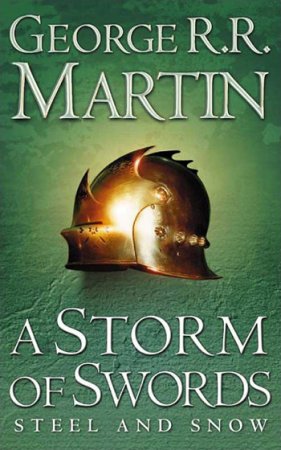 A Storm of Swords
A Storm of Swords A Feast for Crows
A Feast for Crows A Clash of Kings
A Clash of Kings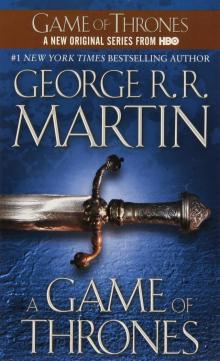 A Game of Thrones
A Game of Thrones Mississippi Roll
Mississippi Roll Wild Cards V: Down and Dirty
Wild Cards V: Down and Dirty Busted Flush
Busted Flush When the Devil Drives
When the Devil Drives Dying of the Light
Dying of the Light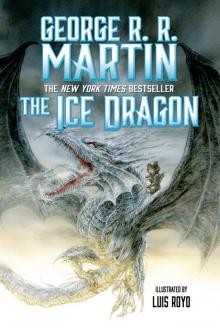 The Ice Dragon
The Ice Dragon Sandkings
Sandkings Jokertown Shuffle
Jokertown Shuffle Dreamsongs. Volume II
Dreamsongs. Volume II Deuces Down
Deuces Down When We Were Heroes
When We Were Heroes Warriors
Warriors In the House of the Worm
In the House of the Worm Death Draws Five
Death Draws Five Dreamsongs. Volume I
Dreamsongs. Volume I Marked Cards
Marked Cards Dreamsongs
Dreamsongs Card Sharks
Card Sharks Dangerous Women
Dangerous Women Inside Straight
Inside Straight Turn of the Cards
Turn of the Cards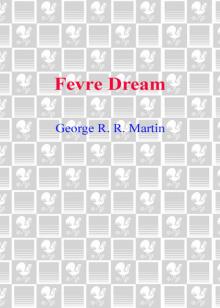 Fevre Dream
Fevre Dream High Stakes: A Wild Cards Novel
High Stakes: A Wild Cards Novel Windhaven
Windhaven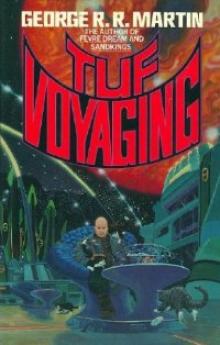 Tuf Voyaging
Tuf Voyaging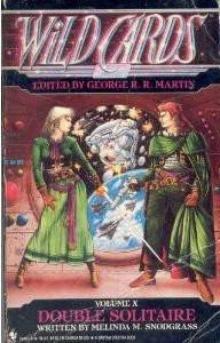 Double Solitaire
Double Solitaire The Sworn Sword
The Sworn Sword Low Chicago
Low Chicago Dead Man's Hand
Dead Man's Hand Wild Cards
Wild Cards Black Trump
Black Trump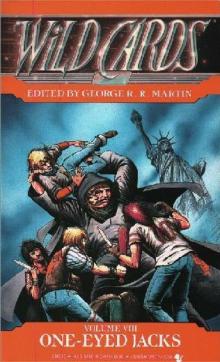 One Eyed Jacks
One Eyed Jacks Wild Cards: Aces Abroad
Wild Cards: Aces Abroad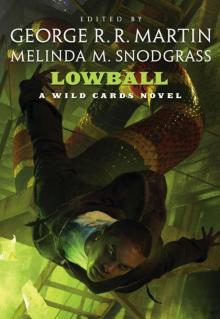 Lowball: A Wild Cards Novel
Lowball: A Wild Cards Novel Double Solitaire (2019 Edition)
Double Solitaire (2019 Edition) Dealer's Choice
Dealer's Choice Ace in the Hole
Ace in the Hole A Song for Lya: And Other Stories
A Song for Lya: And Other Stories Three Kings
Three Kings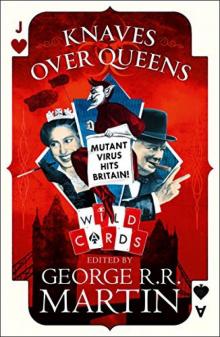 Knaves Over Queens
Knaves Over Queens Joker Moon
Joker Moon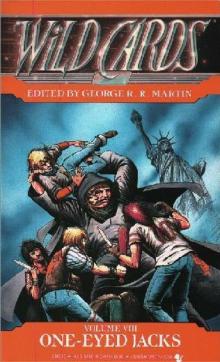 One Eyed Jacks wc-8
One Eyed Jacks wc-8 Down And Dirty wc-5
Down And Dirty wc-5 Mississippi Roll_A Wild Cards Novel
Mississippi Roll_A Wild Cards Novel A Feast for Dragons
A Feast for Dragons The Sworn Sword ttodae-2
The Sworn Sword ttodae-2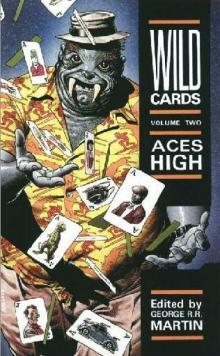 Aces High wc-2
Aces High wc-2 Wild Cards 13 : Card Sharks
Wild Cards 13 : Card Sharks Way of the Wizard
Way of the Wizard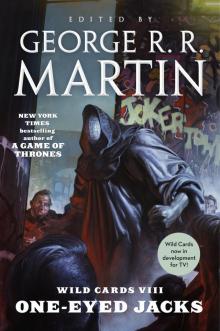 Wild Cards VIII: One-Eyed Jacks
Wild Cards VIII: One-Eyed Jacks A Dance With Dragons: Book 5 of A Song of Ice and Fire (Song of Ice & Fire 5)
A Dance With Dragons: Book 5 of A Song of Ice and Fire (Song of Ice & Fire 5) The Princess and The Queen, Or, The Blacks and The Greens (a song of ice and fire)
The Princess and The Queen, Or, The Blacks and The Greens (a song of ice and fire)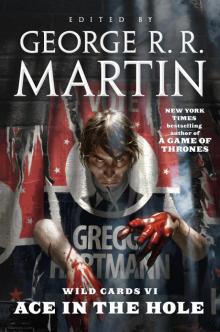 Wild Cards VI--Ace in the Hole
Wild Cards VI--Ace in the Hole The World of Ice & Fire: The Untold History of Westeros and the Game of Thrones (A Song of Ice and Fire)
The World of Ice & Fire: The Untold History of Westeros and the Game of Thrones (A Song of Ice and Fire)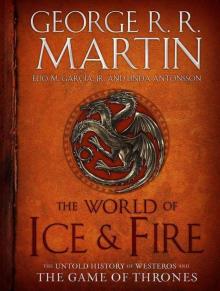 The World of Ice & Fire: The Untold History of Westeros and the Game of Thrones
The World of Ice & Fire: The Untold History of Westeros and the Game of Thrones Busted Flush wc-19
Busted Flush wc-19 A Knight of the Seven Kingdoms
A Knight of the Seven Kingdoms Nightflyers: The Illustrated Edition
Nightflyers: The Illustrated Edition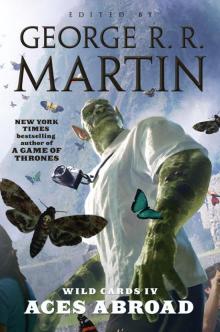 Wild Cards IV
Wild Cards IV Portraits of His Children
Portraits of His Children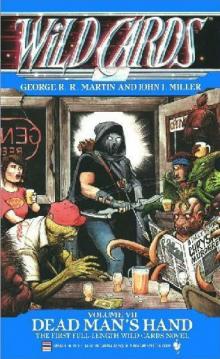 Dead Mans Hand wc-7
Dead Mans Hand wc-7 Jokers Wild wc-3
Jokers Wild wc-3 The Lonely Songs of Laren Dorr
The Lonely Songs of Laren Dorr Wild Cards III: Jokers Wild
Wild Cards III: Jokers Wild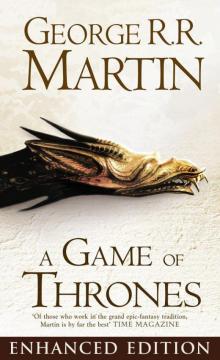 A Game of Thrones Enhanced Edition
A Game of Thrones Enhanced Edition Nightflyers & Other Stories
Nightflyers & Other Stories Armageddon Rag
Armageddon Rag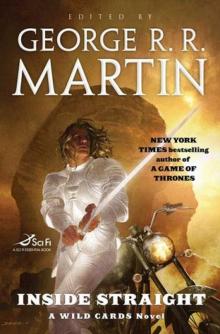 Wild Cards: Inside Straight
Wild Cards: Inside Straight A Song for Lya
A Song for Lya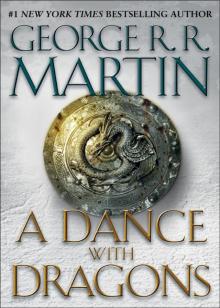 A Dance with Dragons: A Song of Ice and Fire: Book Five
A Dance with Dragons: A Song of Ice and Fire: Book Five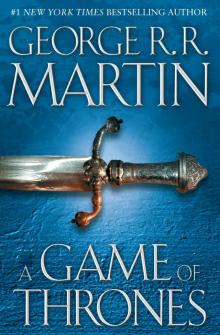 Song of Fire & Ice 01 - A Game of Thrones
Song of Fire & Ice 01 - A Game of Thrones Death Draws Five wc-17
Death Draws Five wc-17 Turn of the Cards w-12
Turn of the Cards w-12 Wild Cards 14 - Marked Cards
Wild Cards 14 - Marked Cards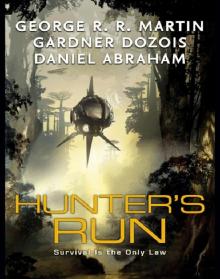 Hunter's Run
Hunter's Run The Glass Flower
The Glass Flower A Clash of Kings asoiaf-2
A Clash of Kings asoiaf-2 A Game of Thrones 5-Book Bundle: A Song of Ice and Fire Series: A Game of Thrones, A Clash of Kings, A Storm of Swords, A Feast for Crows, and A Dance with Dragons (Song of Ice & Fire)
A Game of Thrones 5-Book Bundle: A Song of Ice and Fire Series: A Game of Thrones, A Clash of Kings, A Storm of Swords, A Feast for Crows, and A Dance with Dragons (Song of Ice & Fire) Ace In The Hole wc-6
Ace In The Hole wc-6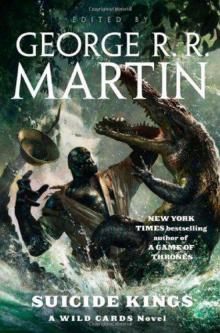 Suicide Kings wc-20
Suicide Kings wc-20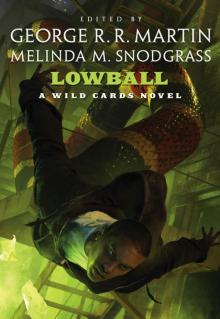 Lowball
Lowball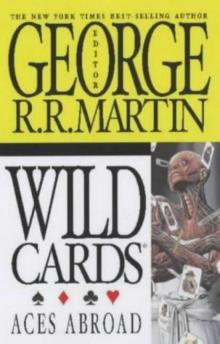 Aces Abroad wc-4
Aces Abroad wc-4 George R. R. Martin's a Game of Thrones 4-Book Bundle
George R. R. Martin's a Game of Thrones 4-Book Bundle A Feast for Crows asoiaf-4
A Feast for Crows asoiaf-4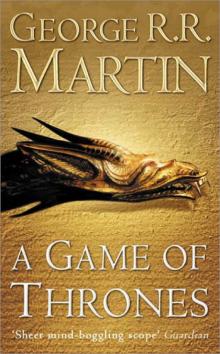 A Game of Thrones asoiaf-1
A Game of Thrones asoiaf-1 The Mystery Knight ttodae-3
The Mystery Knight ttodae-3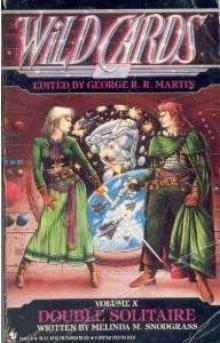 Double Solitaire w-10
Double Solitaire w-10 Wild Cards 15 - Black Trump
Wild Cards 15 - Black Trump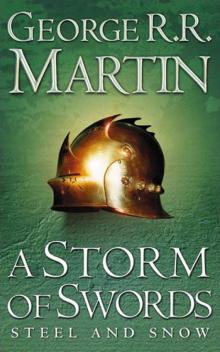 A Storm of Swords asoiaf-3
A Storm of Swords asoiaf-3 The Hedge Knight ttodae-1
The Hedge Knight ttodae-1 Dreamsongs 2-Book Bundle
Dreamsongs 2-Book Bundle The World of Ice & Fire
The World of Ice & Fire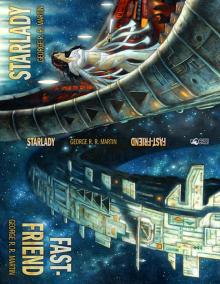 Starlady & Fast-Friend
Starlady & Fast-Friend Old Mars
Old Mars Fantasy For Good: A Charitable Anthology
Fantasy For Good: A Charitable Anthology Wild Cards V
Wild Cards V A Dance with Dragons asoiaf-5
A Dance with Dragons asoiaf-5 Dealer's Choice w-11
Dealer's Choice w-11 The Book of Magic
The Book of Magic A Game of Thrones 4-Book Bundle
A Game of Thrones 4-Book Bundle Texas Hold 'Em
Texas Hold 'Em Wildcards wc-1
Wildcards wc-1 Rogues
Rogues Old Venus
Old Venus